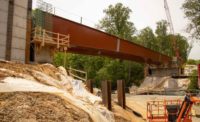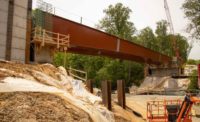Utility relocation issues continue to plague Maryland’s $3.4-billion Purple Line light rail project, with startup of the privately-developed 16.2-mile transit line across Washington, DC’s northern suburbs now pushed back to July 2027—more than five years later than originally planned.
The time extension is part of a Maryland Transit Administration request to the state Board of Public Works to modify the agency’s seven-year-old contract with Purple Line Transit Partners, the development consortium handling design, construction, operations and maintenance.
MTA cited a host of factors for extending the start of revenue service by more than 260 days, including the rail line's “unique history.”
Along with the schedule change, the proposed modification calls for the developer consortium to receive an added $148 million in net compensation for construction activities during the extended period.
The state Board of Public approved the contract modification related to schedule and compensation on July 19.
The transit agency said the Purple Line is more than 50% complete, but with station construction and other activities under way at 60 active sites along the route, utility work has limited the contractor's ability to fully restore project momentum.
The project was idled for nearly two years between the negotiated departure of the original Fluor-led design-build team in fall 2020 and selection of Maryland Transit Solutions, led by Dragados and OHLA, to take over the project in late 2021.
MTA said that since construction on the half-finished Purple Line resumed in April 2022, the project team has dealt with “the complexity of onboarding a new design-build contractor to finish another contractor’s work; the impact of unknown conditions at construction sites that were dormant for two years and as-built conditions that are not as expected."
Slowed Momentum
The agency also pointed to the impact of completing major new construction in a "dense, urban environment while maintaining pedestrian and vehicular traffic; and continued impacts of nationwide workforce challenges, supply chain delays and high inflation.”
Dozens of telecommunications utility relocations that were to be completed or advanced under MTA oversight before the April 2022 handoff to the Dragados-OHLA team remain incomplete, says a May 31 construction progress report to project bondholders. Another area on the project critical path is not expected to be complete and turned over to the contractor until March 2024.
In addition, MTA has yet to complete handover of the Purple Line operations and maintenance facility and associated equipment. The new contractors say defects in facility work overseen by MTA requires correction before its own work can proceed.
The transit agency, developers and contractors have formed a joint team “to evaluate the current schedule and analyze options for mitigation and acceleration strategies,” says the May 31 report.
MTA says these could include rescheduling certain work to run concurrently rather than sequentially, resequencing work activities, extending work hours, adding additional crews, revising maintenance of traffic plans and ordering materials in advance to ensure timely delivery.
Forward Steps
Ray Biggs II, MTA Purple Line project director, said in a statement that the team is also focused on “collaboration with stakeholders and third parties" to advance construction.
He said an agreement with the University of Maryland to close two roads on its College Park campus this summer will enable contractors to “complete construction quicker than if they were working around vehicular traffic.” Also, at a site near two Silver Spring public schools, summer break will allow utility relocations and work to create a sand filter and stormwater management system.
But the Purple Line timeframe and cost could change yet again, pending the outcome of several pending MTA-submitted requests for change proposals in the May 31 report that relate to transferring the scope of agency utility work to the developer. If agreed to, they would likely affect the projected start date for revenue service.
Maryland Gov. Wes Moore (D), who chairs the three-person board, generally has supported state transit projects and recently called Purple Line completion on time and on budget “a priority.” He also has approved restart of planning for the Red Line transit program in Baltimore, cancelled in 2016 by Republican predecessor Larry Hogan in favor of building the Purple Line.






